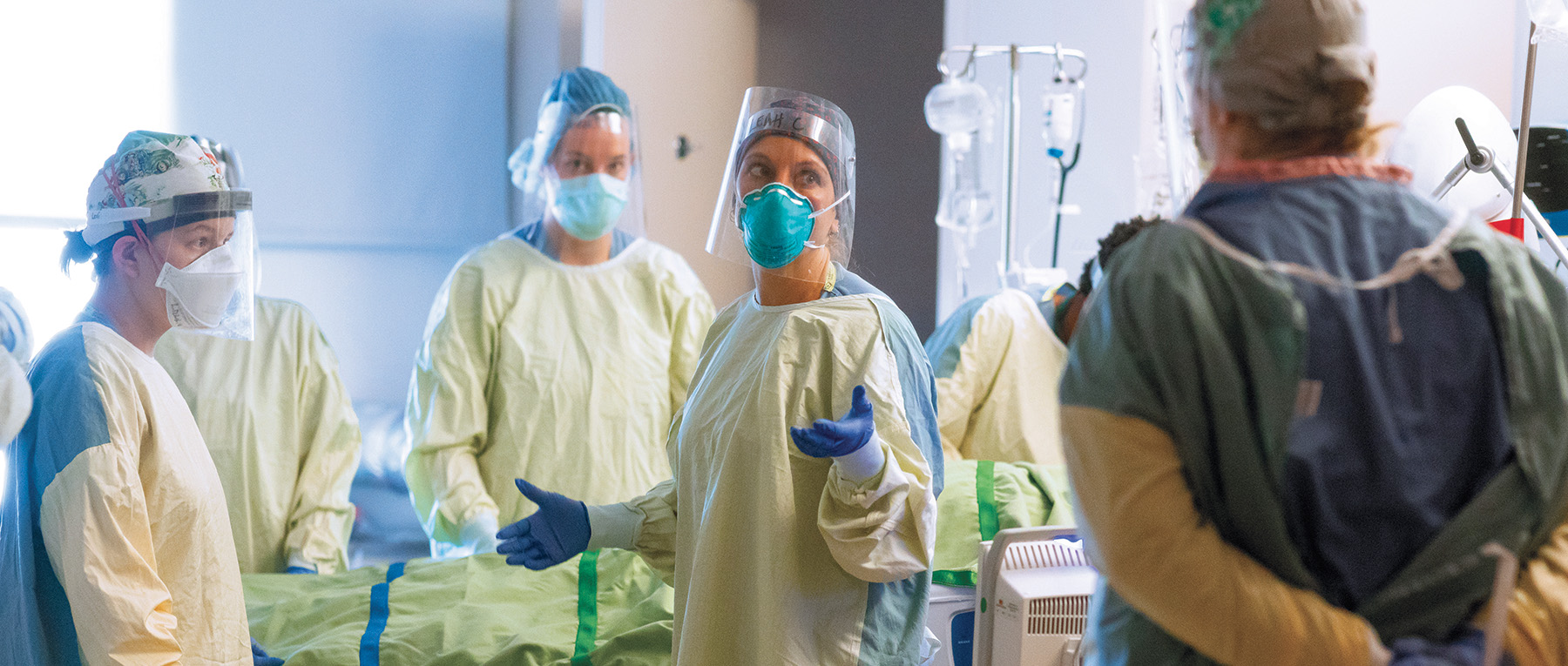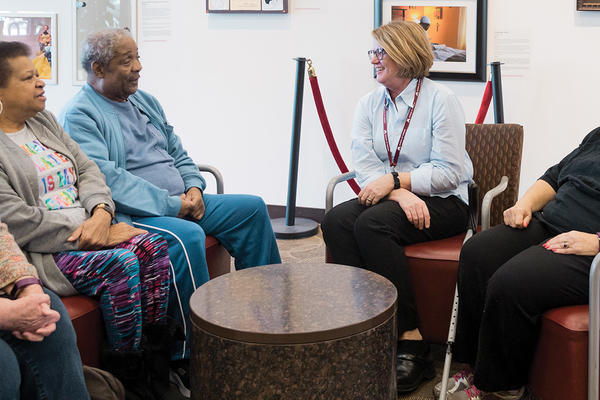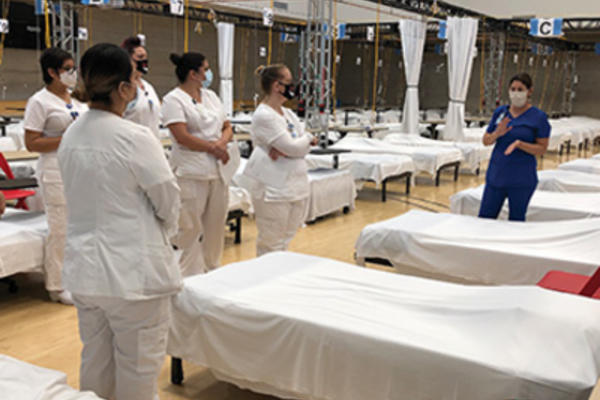Improving our understanding of COVID-19
Nurse researchers quickly adapt to conduct pressing research
November 10, 2020
Brett Stursa

As COVID-19 spread throughout the country and the world, little was initially known about the virus. Nurse researchers at the University of Minnesota quickly adapted their focus to address this deficit.
School of Nursing faculty are using their expertise in informatics, gerontology and wellness to improve the understanding of COVID-19. Recently-funded studies look at the pandemic from a distinctly nurse perspective — how to prevent the spread, how it affects long-term quality of health and how to improve the wellbeing of health care professionals.
Consumer self-reported data used to better understand those who are high risk
Nurse informaticians partnered with M Health Fairview to identify social determinants of health information in patients who are at higher risk of being diagnosed with COVID-19.
“COVID-19 is exposing racial and digital divides across communities. A whole-person picture of health that includes social determinants of health from a strengths-perspective is needed to understand community needs but also strengths or assets,” says School of Nursing Professor Karen Monsen, PhD, RN, FAMIA, FAAN, who is a Co-PI with Assistant Professor Robin Austin, PhD, DNP, DC, RN-BC.
The project, funded by the University of Minnesota Clinical and Translational Science Institute, is collecting data using the School of Nursing-trademarked web-based app, MyStrengths+MyHealth. The data will provide description statistics of M Health Fairview patient needs and their challenges and strengths during the pandemic, including social determinants of health and resilience by geographic area.
The MyStrengths+MyHealth app uses the Omaha System, a standardized, multi-disciplinary health terminology and instrument, to assess the health of individuals and communities.
“MyStrengths+MyHealth presents a new phase of consumer self-reported data to understand hidden or unseen needs of the most vulnerable,” says Monsen.
COVID-19’s long-term effects
Another University of Minnesota School of Nursing study examines if COVID-19 patients suffer long-term side effects from the experience. Research already shows that patients in the intensive care unit (ICU) who are ventilated can experience post intensive care syndrome, which can lead to cognitive and physical impairments, as well as psychological issues. While it is likely that these same conditions are a potential for ventilated COVID-19 patients, researchers will seek to understand if patients with COVID-19 who are hospitalized on a medical unit and never admitted to the ICU develop these conditions because of the unique experience of having a sudden, unanticipated infectious disease.
“We know that there are factors specific to COVID-19 that may contribute to an increased likelihood of long-term effects, like the severity of the disease, prolonged shortness of breath, strict isolation and the impact of sudden illness in previously healthy people,” says Associate Professor Mary Fran Tracy, PhD, RN, APRN, CNS, FCNS, FAAN, principal investigator. “COVID-19 patients can experience symptoms lasting weeks or longer and we have limited knowledge of the short and long-term disease course and potential for re-infection. These factors may predispose patients to new challenges because of their COVID-19 experience.”
Specially, the research will explore the emotional, mental health and physical symptoms COVID-19 patients experience after being discharged. The research will identify gaps in hospital and follow-up care that can be addressed to prevent these consequences and optimize patient outcomes.
Approximately 150 participants, who were hospitalized at M Health Fairview, are being asked to complete surveys. Researchers will also examine electronic health record data for additional information about the patient’s hospitalization.
Co-investigators include Sandy Hagstrom, PhD, RN, APRN, CPNP; Sarah Wente, PhD, RN, and Ruth Lindquist, PhD, RN. The project was funded by a University of Minnesota Clinical and Translational Science Institute grant.
Are older adults exercising less because of COVID-19?
Older adults have the most significant risk for adverse outcomes from COVID-19, so they continue to be a primary focus for prevention efforts such as staying at home and physical distancing. Associate Professor Siobhan McMahon, PhD, MPH, APRN, GNP-BC, is studying whether these efforts influence other health-related behaviors, such as physical activity.
“There is a need to evaluate whether physical activity levels among older adults change during COVID-19 prevention efforts, as a basis for informing the adaptation of physical activity promotion efforts and interventions now and in future pandemics,” says McMahon, who is the lead investigator. This study, Evaluating the effects of COVID-19 Mitigation and Containment Efforts on Older Adults’ Wellbeing and Physical Activity, received funding from the Clinical and Translational Science Institute.
Physical activity is essential for older adults’ health and safety. People who are older than 65 years should perform strengthening exercises at least twice per week, balance-challenging exercises at least three times per week and endurance exercise (like walking) at least 150 minutes per week, according to national guidelines.
This pilot study will ask 120 participants about their physical activity via surveys and in-depth interviews over the course of six months. They will also be asked about their sleep, social support, communication with others and safety practices. Findings are expected to be complete in 12 months.
“We hope findings generated in this study will inform best practices to support and promote older adults’ physical activity during this pandemic and other public health crises,” says McMahon.
Health care provider wellbeing
Researchers from the School of Nursing and the School of Public Health are investigating how stress is affecting Minnesota health care providers in the midst of the COVID-19 pandemic.
The study seeks to understand how health care professionals experience stress, stress management, employee assistance, financial security and COVID-19 symptoms and diagnosis over a 12-month period. Study findings will help inform the development or expansion of organizational support within health care systems to advance the wellbeing of the health care workforce.
“High-quality patient care is critical during the pandemic and taking care of our health care workforce is essential as well. Our study will identify areas of stress that we can then plan to mitigate,” says Professor Jayne Fulkerson, PhD, who is co-principal investigator with School of Public Health Associate Professor Ryan Demmer, PhD.
The study includes two sets of surveys. The first survey will focus on experiences of stress and burnout. The second survey will be administered bi-weekly with questions related to COVID-19, personal protective equipment and other questions about workplace environment. The study also includes an optional component that measures mobility patterns of health care professionals using a phone app.
The study, funded by the Office of the Vice President for Research, includes research partners from Hennepin Healthcare, Fairview, the Minnesota Medical Research Foundation and the Clinical and Translational Science Institute.


